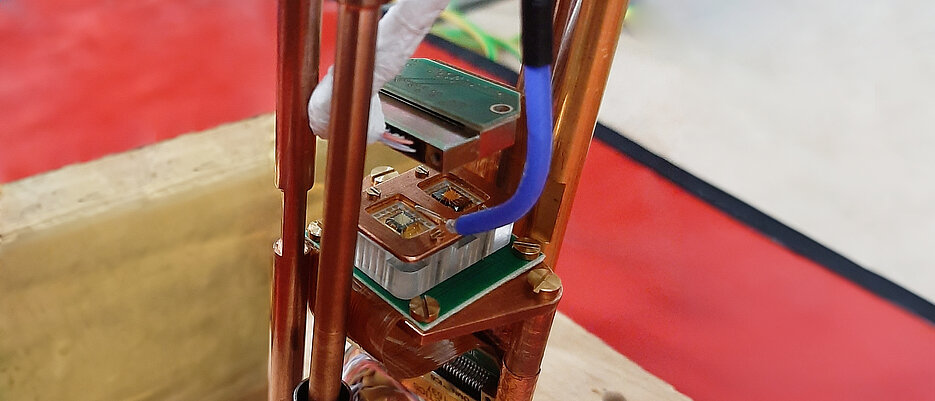Progress in Quantum Physics: Researchers Tame Superconductors
04/04/2024An international team including researchers from the University of Würzburg has succeeded in creating a special state of superconductivity. This discovery could advance the development of quantum computers.

Superconductors are materials that can conduct electricity without electrical resistance – making them the ideal base material for electronic components in MRI machines, magnetic levitation trains and even particle accelerators. However, conventional superconductors are easily disturbed by magnetism. An international group of researchers has now succeeded in building a hybrid device consisting of a stable proximitized-superconductor enhanced by magnetism and whose function can be specifically controlled.
They combined the superconductor with a special semiconductor material known as a topological insulator. “Topological insulators are materials that conduct electricity on their surface but not inside. This is due to their unique topological structure, i.e. the special arrangement of the electrons,“ explains Professor Charles Gould, a physicist at the Institute for Topological Insulators at the University of Würzburg (JMU). “The exciting thing is that we can equip topological insulators with magnetic atoms so that they can be controlled by a magnet.“
The superconductors and topological insulators were coupled to form a so-called Josephson junction, a connection between two superconductors separated by a thin layer of non-superconducting material. “This allowed us to combine the properties of superconductivity and semiconductors“, says Gould. “So we combine the advantages of a superconductor with the controllability of the topological insulator. Using an external magnetic field, we can now precisely control the superconducting properties. This is a true breakthrough in quantum physics!“
Superconductivity Meets Magnetism
The special combination creates an exotic state in which superconductivity and magnetism are combined – normally these are opposite phenomena that rarely coexist. This is known as the proximity-induced Fulde-Ferrell-Larkin-Ovchinnikov (p-FFLO) state. The new “superconductor with a control function“ could be important for practical applications, such as the development of quantum computers. Unlike conventional computers, quantum computers are based not on bits but on quantum bits (qubits), which can assume not just two but several states simultaneously.
“The problem is that quantum bits are currently very unstable because they are extremely sensitive to external influences, such as electric or magnetic fields“, says physicist Gould. “Our discovery could help stabilise quantum bits so that they can be used in quantum computers in the future.“
International Quantum Research Team
The experimental research was carried out by a team from the Chair of Experimental Physics III of Professor Laurens W. Molenkamp in Würzburg. It was carried out in close collaboration with theoretical experts from the group of Professor F. Sebastian Bergeret of the Centre for Materials Physics (CFM) in San Sebastian, Spain, and Professor Teun M. Klapwijk of Delft University of Technology in the Netherlands.
The international research group was funded by the Cluster of Excellence ct.qmat (Complexity and Topology in Quantum Materials), the German Research Foundation (DFG), the Free State of Bavaria, the Spanish Agencia Estatal de Investigación (AEI), the European research programme Horizon 2020 and the EU ERC Advanced Grant Programme.
About the Study
Pankaj Mandal, Soumi Mondal, Martin P. Stehno, Stefan Ilić, F. Sebastian Bergeret, Teun M. Klapwijk, Charles Gould & Laurens W. Molenkamp. Magnetically tunable supercurrent in a dilute magnetic topological insulator based Josephson junctions. Nature Physics. DOI: 10.1038/s41567-024-02477-1
Cluster of Excellence ct.qmat
The Würzburg team participates in the Cluster of Excellence ct.qmat – Complexity and Topology in Quantum Matter, which has been jointly run by the University of Würzburg (JMU) and Technische Universität (TU) Dresden since 2019. Over 300 scientists from more than thirty countries and four continents study topological quantum materials that reveal surprising phenomena under extreme conditions such as ultra-low temperatures, high pressure, or strong magnetic fields. ct.qmat is funded through the German Excellence Strategy of the Federal and State Governments and is the only Cluster of Excellence in Germany to be based in two different federal states.
Contact
Prof. Dr. Charles Gould, Experimental Physics III, Tel. +49 931 31-85899, gould@physik.uni-wuerzburg.de






